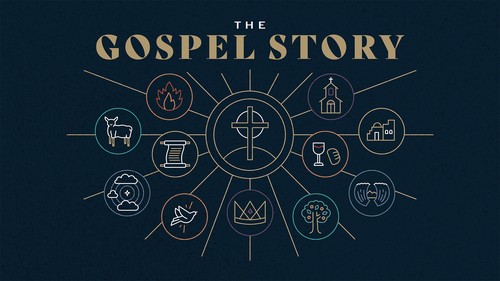The Gospel Story - Week 29

Read
Matthew 1:1-17
Since the last of the Old Testament prophets there has been hundreds of years of “silence.” In our current Bibles the gospel account of Matthew “breaks the silence,” so to speak, with a genealogy that leads all the way up to Jesus, the Messiah. What at first glance seems like a simple list of names with obscure names in it then, once you dive deeper, reveals not only a path to a Messiah that only God could have patch-worked together but a family tree that fulfills outlook of the gospel of Jesus. Running through the genealogy we have people who are messy and broken, and people that did not necessarily live saintly lives. In looking at it you also have non-Jews, known as Gentiles, in the family tree of Jesus. We can also notice that there are significant women mentioned, such as Ruth and Rahab, which would have been out of the ordinary for a genealogy.
So what does this family tree tell us? That the savior of the world can come from a history and family full of brokenness and sin. God can work not just in spite of it all but to forgive what may seem like the worst of sins and mend what seems beyond repair. God is not worried about being placed into a family line of brokenness. What this also reveals is that the Messiah is not just for the Jewish people. The savior of the world did not come into the world through a purely Jewish family but one that weaved through the Gentiles as well. The savior is for everyone. Jesus came into the world because of the strength, courage, and care of women just as much as men. Jesus redeems and gives hope to a family line that does not follow the “perfect” norms.
A good news truth from the family line of Jesus is this: in a world that is full of generational brokenness, sin, trauma, and messiness, Jesus can still redeem, save, restore, and give life because that is the kind of family Jesus comes from. We do not need to resign ourselves to be objects at the end of our generational production line; what is available to us is the possibility of becoming new creations because that is what Jesus does.
So what does this family tree tell us? That the savior of the world can come from a history and family full of brokenness and sin. God can work not just in spite of it all but to forgive what may seem like the worst of sins and mend what seems beyond repair. God is not worried about being placed into a family line of brokenness. What this also reveals is that the Messiah is not just for the Jewish people. The savior of the world did not come into the world through a purely Jewish family but one that weaved through the Gentiles as well. The savior is for everyone. Jesus came into the world because of the strength, courage, and care of women just as much as men. Jesus redeems and gives hope to a family line that does not follow the “perfect” norms.
A good news truth from the family line of Jesus is this: in a world that is full of generational brokenness, sin, trauma, and messiness, Jesus can still redeem, save, restore, and give life because that is the kind of family Jesus comes from. We do not need to resign ourselves to be objects at the end of our generational production line; what is available to us is the possibility of becoming new creations because that is what Jesus does.
Questions
- Does the Christmas season tend to fill you up or drain you more? Why?
- How long are you able to sit in silence on your own? Are you usually comfortable with it, loving the peace and quiet, or are you more inclined to fidget and itch for some kind of noise to listen to?
- 400 years is a long time for people to wait to hear from God. Have you ever wondered why God waited so long to send Jesus?
- Are there parts of your own family tree that you wish weren’t so messy?
- How do you think about Jesus differently knowing that he came from a family tree that wasn’t “perfect”? What does that mean for us as we seek to show Jesus to others in our words and actions?
Supporting Resources
Posted in The Gospel Story
Recent
Archive
2025
August
2023
2022
June
July
August
September
October
November

No Comments